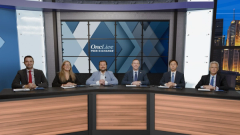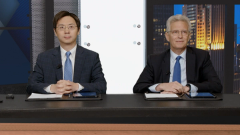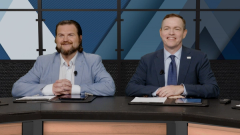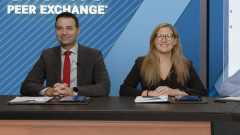
Sequencing Novel Therapies in Relapsed/Refractory Diffuse Large B-Cell Lymphoma
Comprehensive insight on the optimal sequencing of novel therapies in patients with relapsed/refractory diffuse large B-cell lymphoma.
Episodes in this series

Transcript:
Matthew A. Lunning, DO, FACP: Dr Saeed, let’s talk about CD19 exposure with tafasitamab, and if you’re using that in the second-line setting. We’ve heard that you can make patients have a response, and then they go from CAR T-cell [therapy] ineligible to eligible, or they may be driving a response to TAFA-LEN [tafasitamab and lenalidomide]. What are your thoughts on sequencing of [tafasitamab and lenalidomide]? Is it a drug you would be willing to move earlier and reserve CAR T cell for later? How do you walk through that discussion?
Hayder M. Saeed, MD: We still lack the data to understand the sequencing of those drugs, what we have now is very limited. I go by what we’ve seen from the long-term results of the L-MIND study, which showed that patients in second-line therapy seem to do better when they get treated with [tafasitamab and lenalidomide] than if they get treated in the subsequent line of treatment, which is understood because you have sicker patients who are exposed to multiple lines of treatment. We’ve seen from the mechanism of action of tafasitamab, it seems to improve the immune system in a way to fight the cancer. I keep those things in mind whenever I make the choice if I’m going to treat the patient with [tafasitamab and lenalidomide], if they don’t have the means or don’t have the CAR Ts available for them right away to give them the cure option right away in the second-line treatment. I prefer to use it in that line of treatment. There are some reports, although not confirmed, on a cellular level that if you potentially use [tafasitamab and lenalidomide] as a CD19-targeted therapy prior to CAR T-cell therapy, there might be some activity that may enhance the response from CAR T cell. That has not been confirmed in the trials or in the patients. But it’s a little promising that if we have to target the CD19 with [tafasitamab and lenalidomide] prior to CAR T cell, then we’re not losing, we’re not occupying that receptor and not able to use CAR T cell subsequently. We can always use it whenever the patient is ready for it.
Matthew A. Lunning, DO, FACP: You’re saying that a CD19 antibody-drug conjugate or antibody exposure does not preclude future CD19 CAR T-cell use?
Hayder M. Saeed, MD: Right. Especially the CD19 antibody.
Matthew A. Lunning, DO, FACP: We don’t have a lot of data on bispecifics before CAR T. Can you comment about what the data are for bispecifics after CAR T?
Hayder M. Saeed, MD: What we’ve seen from what’s published already is that those patients, like we discussed before, post–CAR T-cell relapses are difficult to treat. What we’ve seen from our own experience as well as from the published data, those patients can be recovered with bispecific antibodies. Several studies have shown that the best treatment option for them is the use of a bispecific in the post–CAR T-cell relapse. That’s what we try in general in our practice, to focus on the use of the bispecifics in the post–CAR T-cell relapses. When we have the trials open, we did that, and I imagine as we have the CAR T mAb [monoclonal antibody] available, then we will use it mostly in that setting.
Matthew A. Lunning, DO, FACP: You’re at a big transplant center, and let’s say, I think it was about a third of the patients were able to achieve a CR [complete response]. Are you having the [allogeneic stem cell] transplant discussion if there’s an acceptable donor?
Hayder M. Saeed, MD: Yes.
Matthew A. Lunning, DO, FACP: You have that potential narrow window. The data are interesting because there are signs of durability, but it is also relapsed/refractory large cell lymphoma in the third or fourth line.
Hayder M. Saeed, MD: The numbers are very [few], but we’re shying away from the allo transplant as we have more targeted therapy available with our CD20, CD19 bispecific antibodies, a different form of bispecific antibodies, a different form of allo CARs that are coming down the pipeline. I think we’re shying away from the allo transplant. I don’t remember the last time we referred an allo BMT [bone marrow transplant] for diffuse large B-cell lymphoma, even in this small group of patients.
Matthew A. Lunning, DO, FACP: Maybe CAR after CAR, it’s like a blended CAR.
Hayder M. Saeed, MD: We can do that. We’ve done it.
Matthew A. Lunning, DO, FACP: I think there was some early axi-cel [axicabtagene ciloleucel] experience of CAR after CAR from that standpoint.
Transcript edited for clarity.








































